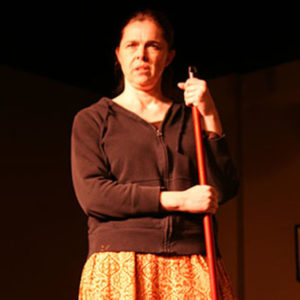
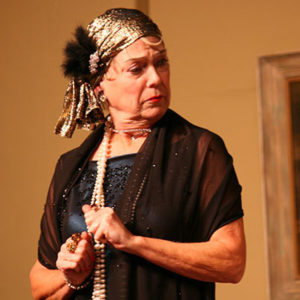
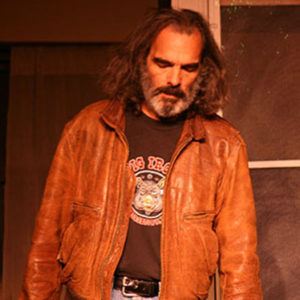
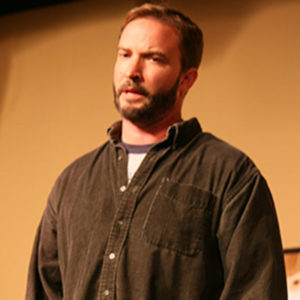
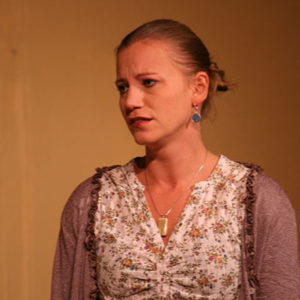
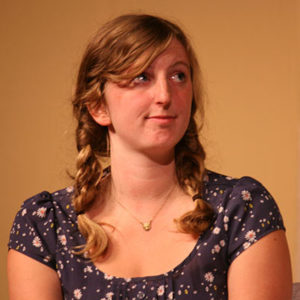






[metaslider id=165]
This was the most-talked-about play we had ever done.
“Calendar Girls” is based on a true story of a Women’s Institute (WI) in Yorkshire, England who put together a calendar to raise money for leukemia research. This play, written by Tim Wirth (who also co-wrote the screenplay for the movie of the same name) has a cast of 14 people; some new to the Actors Theater and many of our regulars.
When Annie’s (Suzanne Gropper) husband John (Tony Lee) dies of leukemia, she and best friend Chris (Bev Leyman) resolve to raise money for a new settee in the local hospital waiting room. They manage to persuade four fellow WI members (Holly King, Lesley Liddle, Melinda Milligan and Bailey Sande) to pose nude with them for an “alternative” calendar, with a little help from hospital porter and amateur photographer Lawrence (Kelly Toombs).
The news of the women’s charitable venture spreads like wildfire, and hordes of press soon descend on the small village of Knapeley in the Yorkshire Dales. The calendar is a success, but Chris and Annie’s friendship is put to the test under the strain of their new-found fame. Other actors include Aaimee Johnson, Annette Garver, Carla Weston, Freddy Hinkle, John Mazzarella and Quija Keogh. “Calendar Girls” is directed by Doug Bechtel.
“Calendar Girls” opened on Friday, September 11, 2015 with additional performances on Saturday, the 12th; Friday, the 18th; Saturday, the 19th; Friday the 25th; Saturday, the 26th and Sunday the 27th. All performances are at the Grange at 7:30 pm.
The cast and crew of our local production of “Calendar Girls” also made a 2016 calendar which was available for purchase at intermission.
What some newspapers have said about “Calendar Girls”:
“It’s a show full of poignant moments – about friendship, determination and hope; about loss in many forms; about the importance of acceptance; about knowing when to let go. But it also offers plenty of humour, as the six friends and WI members decide to pose nude for a calendar” – Liverpool Daily Post
“Unashamedly sentimental and full of heart and bare-faced cheek, Tim Firth’s stage adaptation of his own film script, inspired by the group of Yorkshire WI members who stripped off for a charity calendar to raise money for Leukaemia Research, should rake in a bob or two itself.” – The Guardian
Other Desert Cities by Jon Robin Baitz
Thursday, Friday, Saturday — November 11, 12, 13
Thursday, Friday, Saturday — November 18, 19, 20
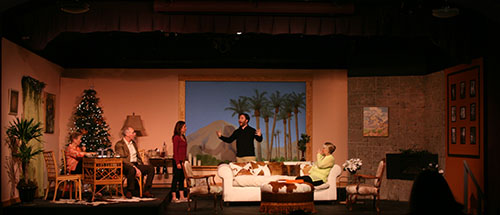 Actors Theater of Orcas Island invites you to take a visit to the Palm Springs desert, and into the home of the Wyeth family as they gather together on Christmas Eve 2004 in an upcoming production of Other Desert Cities by Jon Robin Baitz (ABC’s Brothers & Sisters).
Actors Theater of Orcas Island invites you to take a visit to the Palm Springs desert, and into the home of the Wyeth family as they gather together on Christmas Eve 2004 in an upcoming production of Other Desert Cities by Jon Robin Baitz (ABC’s Brothers & Sisters).
Brooke Wyeth returns home after a six-year absence to celebrate Christmas with her parents, her brother, and her aunt. Brooke announces that she is about to publish a memoir dredging up a pivotal and tragic event in the familys history a wound they dont want reopened. In effect, she draws a line in the sand and dares them all to cross it.
Other Desert Cities, directed by Lin McNulty, features outstanding performances by Katie Zwilling (Brooke), Melinda Milligan (Polly), Tom Fiscus (Lyman), Indy Zoeller (Trip), and Suzanne Gropper (Silda). Power, passion, and superbly-crafted dialogue highlights this performance.
The most richly enjoyable new play for grown-ups that New York has known in many seasons In his most fully realized play to date, Mr. Baitz makes sure our sympathies keep shifting among the members of the wounded family portrayed here. Every one of them emerges as selfish, loving, cruel, compassionate, irritating, charming, and just possibly heroic leaves you feeling both moved and gratifyingly sated. The New York Times
Other Desert Cities runs Friday through Sunday, November 11-13 & 16-18 at 7:30 p.m. at The Grange. Tickets are $10 and available from Darvills, brownpapertickets.com, and at the door. On opening night, Veterans are free. This may not be suitable for children due to language and content.
Other Desert Cities by Jon Robin Baitz
Thursday, Friday, Saturday — November 11, 12, 13
Thursday, Friday, Saturday — November 18, 19, 20
CHARACTERS:
Katie Zwilling as Brooke Wyeth
Melinda Milligan as Polly Wyeth
Tom Fiscus as Lyman Wyeth
Suzanne Gropper as Silda Grauman
Indy Zoeller as Trip Wyeth
PLACE:
The Wyeth house
TIME:
Christmas Eve, 2004
Brooke Wyeth returns home to Palm Springs after a six-year absence to celebrate Christmas with her parents, her brother and her aunt. Brooke announces that she is about to publish a memoir dredging up a pivotal and tragic event in the family’s history — a wound they don’t want reopened. In effect, she draws a line in the sand and dares them all to cross it.
“The most richly enjoyable new play for grown-ups that New York has known in many seasons — In his most fully realized play to date, Mr. Baitz makes sure our sympathies keep shifting among the members of the wounded family portrayed here. Every one of them emerges as selfish, loving, cruel, compassionate, irritating, charming, and just possibly heroic — leaves you feeling both moved and gratifyingly sated.” – The New York Times
| 2018 | PLAY | PLAYWRIGHT | VENUE |
| February | Barefoot in the Park | Neil Simon | The Grange |
| May | Playfest 2018 | The Grange | |
| Non-Violent Gulch | Evan Wagoner-Lynch | ||
| Camelot | Nancy Reas | ||
| Dust | Mary Bayley | ||
| Moira | Kat Blucker | ||
| Thirteen This Way | Miguel Villareal | ||
| Coming Out | Heather Thomas | ||
| Adventures of Jack Armstrong | Hank Pollard | ||
| 2017 | PLAY | PLAYWRIGHT | VENUE |
| May-June | Playfest 2017 | The Grange | |
| Needs New Batteries | Cara Russell | ||
| Emerald City | Corey Homewood | ||
| What’s New | Miguel Villareal | ||
| Wedding Dance | Tom Fiscus | ||
| 2.5 Kids | Kat Fennell | ||
| TJ | James Wolf | ||
| Open House at Murder Mansion | Mack Smith | ||
| July | My Old Lady (Reader’s Theater) | Christopher Durang | Random Howse |
| September | The Other Place | Jon Robin Baitz | The Grange |
| 2016 | PLAY | PLAYWRIGHT | VENUE |
| February | Vanya And Sonia And Masha and Spike | Christopher Durang | The Grange |
| April | PlayFest 2016 | The Grange | |
| Boede Family: History in One Act | Janet Brownell | ||
| Salutation, Valediction | Indy Zoeller | ||
| This Play Was Written in Sand | M. L. Thomas | ||
| The Sounds of Silence | Kathi Ciskowski | ||
| St. Lora | Adia Dolan | ||
| Never Coming Back | Cali Bagby | ||
| The Road to Tranquility | Jackie Bates | ||
| June | Deuce (Readers Theater) | Terrence McNally | Random Howse |
| August | Roses in December (Readers Theater) | Victor L. Cahn | Random Howse |
| November | Other Desert Cities | Jon Robin Baitz | The Grange |
| 2015 | PLAY | PLAYWRIGHT | VENUE |
| February | Calendar Girls | Tim Firth | The Grange |
| February | Mama Won’t Fly | Jessie Jones, Nicholas Hope, Jamie Wooten | The Grange |
| February | PlayFest 2015 | The Grange | |
| A Most Auspicious Day | Kristen Wilson | ||
| Peggy | James Wolf | ||
| The Certified Letter | Kathi Ciskowski | ||
| Confessions of a Toilet Paper Hoarder | Amy Russell | ||
| Storytime | Mary Bayley | ||
| The Bedroom | Ron Herman | ||
| Tenacity | Michele Griskey | ||
| June | God Damn Tom (Readers Theater) | Wayne S. Rawley | Random Howse |
| July | The Frog Prince (Readers Theater) | David Mamet | Random Howse |
| 2014 | PLAY | PLAYWRIGHT | VENUE |
| February | Moonlight and Magnolias | Ron Hutchinson | The Grange |
| April | PlayFest 2014 | The Grange | |
| Hammerfest Date Night | Cara Russell | ||
| Mephisto Waltz #1 | Brigid Ehrmantraut | ||
| A Dish Served Cold | Tom Fiscus | ||
| Night Lights | Rick Markov | ||
| Main Course | Michele Griskey | ||
| Prelude to Notoriety | Rebecca Herman | ||
| Four Christmases | James Wolf | ||
| June | Burying Aunt Beulah | ||
| July | Three Viewings | ||
| August | Tuesdays With Morrie | ||
| September | Love Song | The Grange | |
| November | Familiar Distance | The Grange | |
| Lilacs | Michele Griskey | ||
| I Used to Live Here | James Wolf | ||
| Safe & Warm | Lin McNulty | ||
| 2013 | PLAY | PLAYWRIGHT | VENUE |
| February | Hotbed Hotel | The Grange | |
| April | PlayFest 2013 | The Grange | |
| The Palm Reader | James Wolf | ||
| Yard Sale | Jackie Bates | ||
| Adverse Possession | Bill Westlake | ||
| A Play at the Plate | Indy Zoeller | ||
| Devil May Care | FX Michels | ||
| Results Are In | Lin McNulty | ||
| Sign Off | Cara Russell | ||
| July | Love, Loss And What I Wore | The Grange | |
| September | Arthur: The Hunt | Jeff Berryman | The Grange |
| December | Almost, Maine | John Cariani | The Grange |
| 2012 | PLAY | PLAYWRIGHT | VENUE |
| February | When Bullfrogs Sing Opera | The Grange | |
| April | PlayFest 2012 | The Grange | |
| Diminished Thirds | Indy Zoeller | ||
| The Waiting Room | Jackie Bates | ||
| It’s All About the Breath | Luann Pamatian | ||
| Square One | Lin McNulty | ||
| Thought for Food | Cara Russell | ||
| Held | Ron Herman | ||
| May the Force | Michele Griskey | ||
| July | Einstein | The Grange | |
| September | Torso | The Grange | |
| November | Tracers | The Grange | |
| 2011 | PLAY | PLAYWRIGHT | VENUE |
| February | The Curious Savage | The Grange | |
| April | PlayFest 2011 | ||
| Round Trip Fare | Lin McNulty | ||
| Necessary Risks | Brigid Ehrmantraut | ||
| Test | Jennifer Brennock | ||
| The Reunion | Susan Anderson | ||
| Lockdown | Michele Griskey | ||
| The Request | Ron Herman | ||
| Digital Disconnect | Andrea Hendrick, Ruthie Newman, Mary Poletti | ||
| June | Southern Comforts | Kathleen Clark | |
| July | Trying | Johanna McClelland Glass | The Grange |
| September | By Request | The Grange | |
| December | F.A.H.E.T.G. Dramatic Society Christmas Carol | The Grange | |
| 2010 | PLAY | PLAYWRIGHT | VENUE |
| February | Noises Off | Michael Frayn | The Grange |
| May | PlayFest 2010 | The Grange | |
| Of Men and Motorcycles | Jackie Bates | ||
| After | Anita Leigh Holladay | ||
| One on One | John Aschoff | ||
| After and After | Sandy Thompson | ||
| Clear! | Ron Herman | ||
| Play Noir | Michele Griskey | ||
| Your Truly | Louise Charnacan | ||
| June | The Sunshine Boys | ||
| July | Getting Along Famously | Michael Jacobs | The Grange |
| 2009 | PLAY | PLAYWRIGHT | VENUE |
| February | Wait Until Dark | Frederick Knott | The Grange |
| May | PlayFest 2009 | The Grange | |
| Snow White – Big Green | Elsie McFarland | ||
| Always Be Composting | Terrel Kaplan | ||
| The Birthday Present | Ron Herman | ||
| Odysseus Domesticated | Bill Westlake | ||
| Still Life | Michele Griskey | ||
| Bedside Manners | Lin McNulty | ||
| With Windows Painted Black | Ginni Stern | ||
| June | Waiting For MacArthur | P. Paullette MacDougal | The Grange |
| July | Love Letters | The Grange | |
| September | Brilliant Traces | Cindy Lou Johnson | The Grange |
| September | Echo Lake (Book-It) | The Grange | |
| 2008 | PLAY | PLAYWRIGHT | VENUE |
| March | Lend Me A Tenor | The Grange | |
| May | PlayFest 2008 | The Grange | |
| In the Garden | Elsie McFarland | ||
| Necessary | Alyssa Knickerbocker | ||
| Curtains | Jackie Bates | ||
| Taking Up Space | Louise Carnachan | ||
| Ammonia and Water | Bill Westlake | ||
| Rainy Day Incident | Marguerite Olson | ||
| The Homecoming | Ron Herman | ||
| July | The Dixie Swim Club (Readers Theater) | The Grange | |
| October | The Jim French Radio Show | Jim French | The Grange |
| 2007 | PLAY | PLAYWRIGHT | VENUE |
| March | A Most Notorious Woman (Book-It) | The Grange | |
| April | The Enchanted April | The Grange | |
| May | PlayFest 2007 | The Grange | |
| October | An Evening with Chekhov | The Grange | |
| October | Improv! (Book-It) | The Grange | |
| December | It’s A Wonderful Life (Readers Theater) | The Grange | |
| 2006 | PLAY | PLAYWRIGHT | VENUE |
| February | 84 Charing Cross Road (Readers Theater) | ||
| February | Love, Sex And The IRS | ||
| March | The Seabeck Scenes | ||
| May | PlayFest 2006 | ||
| June | Theater Classics Sampler #3 | ||
| August | Eight By Ten | The Grange | |
| October | Improv! (Book-It) | The Grange | |
| October | Lilia! (Book-It) | The Grange | |
| November | A Man For All Seasons (Readers Theater) | The Grange | |
| 2005 | PLAY | PLAYWRIGHT | VENUE |
| June | Theater Classics Sampler #1 | ||
| July | Art (Readers Theater) | ||
| August | Theater Classics Sampler #2 | ||
| November | War Of The Worlds (Readers Theater) | ||
| 2004 | PLAY | PLAYWRIGHT | VENUE |
| March | Proof (Readers Theater) | ||
| April | Jakes Women (Readers Theater) | ||
| June | The Vagina Monologues | ||
| September | Tesla (Book-It) | ||
| September | The Vagina Monologues (Remount) | ||
| October | The Vagina Monologues | ||
| November | The Need To Know (Book-It) | ||
| 2003 | PLAY | PLAYWRIGHT | VENUE |
| January | The Comedy of Lewis Carroll (Readers Theater) | ||
| March | Tribute | ||
| April | Visiting Mr. Green (Readers Theater) | ||
| May | Mystery Theater | ||
| June | Over The River And Through The Woods | ||
| August | The Guys (Readers Theater) | ||
| September | The Jim French Radio Show | ||
| 2002 | PLAY | PLAYWRIGHT | VENUE |
| February | Mystery Theater | ||
| April | Don Juan In Hell (Readers Theater) | ||
| June | The Odd Couple (Female Version) | ||
| September | The Jim French Radio Shows | Jim French | |
| 2001 | PLAY | PLAYWRIGHT | VENUE |
| January | Song At Twilight (Readers Theater) | ||
| March | Chapter Two | ||
| June | Arsenic and Old Lace | ||
| July | Mystery Theater | ||
| August | Over The River And Through The Woods | ||
| September | The Jim French Radio Show | Jim French | |
| October | Three Viewings (Readers Theater) | ||
| November | The Songs of Broadway (Music) | ||
| 2000 | PLAY | PLAYWRIGHT | VENUE |
| February | Love Letters | ||
| June | The Rape of Bunny Stuntz (Readers Theater) | ||
| July | Spoon River Anthology (Readers Theater) | ||
| July | The Gin Game (Readers Theater) | ||
| July | The Wild Party (Readers Theater) | ||
| July | Three Viewings (Readers Theater) | ||
| August | Far End of the Earth | ||
| August | Valley Song (Readers Theater) | ||
| September | The Jim French Radio Show | Jim French | |
| October | The Woman In Black (Readers Theater) | ||
| December | The Comedy of Lewis Carroll | ||
| 1999 | PLAY | PLAYWRIGHT | VENUE |
| March | The Lady who Cried Fox | ||
| May | The Gin Game (Readers Theater) | ||
| October | To Gillian On Her 37th Birthday | Orcas Center | |
| October | Valley Song (Readers Theater) |